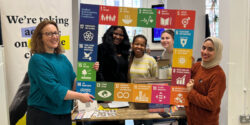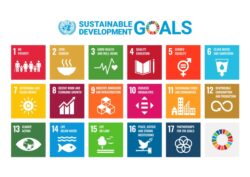Understanding the United Nations Sustainable Development Goals (SDGs)
Here at the University of Leeds we use the United Nations Sustainable Development Goals (SDGs) to drive our work on sustainability.
They are central to our University strategy Universal Values, Global Change, which focuses on our impact and how we make a difference in the world. They are also embedded in our research, teaching and operations.
But what are the SDGs and what do they mean for you?
So what are the SDGs?
In September 2015, the United Nations launched the Sustainable Development Goals (SDGs). This is a set of 17 goals and 169 targets aimed at addressing global challenges over the next 15 years.
Arising from collaborative efforts involving governments from 193 countries, the SDGs represent a comprehensive framework to guide sustainable development worldwide.
The goals are:
- No Poverty
- Zero Hunger
- Good Health and Well-being
- Quality Education
- Gender Equality
- Clean Water and Sanitation
- Affordable and Clean Energy
- Decent Work and Economic Growth
- Industry, Innovation, and Infrastructure
- Reduced Inequality
- Sustainable Cities and Communities
- Responsible Consumption and Production
- Climate Action
- Life Below Water
- Life on Land
- Peace, Justice, and Strong Institutions
- Partnerships for the Goals
You can read a detailed description of each individual goal in the United Nation’s webpage here.
How did the SDGS come about?
The SDGs build on decades of work by countries and the United Nations, originating from the 1992 Earth Summit in Brazil.
Initially, United Nations Member States created the Millenium Development Goals in 2000. These were then expanded upon to become The Sustainable Development Goals in 2015 in order to put more emphasis on multilateral partnerships and sustainability.
Now we have the 17 Sustainable Development Goals which, to summarise, aim to eradicate poverty and hunger, reduce inequalities, promote peaceful societies, protect the environment, and foster sustainable economic growth by 2030.
Consultations are underway to explore the shape of the SDG framework beyond 2030 to continue to drive global action.
Why are they important?
The SDGs take a holistic approach, addressing root causes of poverty and prioritising the needs of vulnerable populations. They emphasise the urgency of climate action and the role of the private sector in driving sustainable development.
Achieving the SDGs would mean a world where everyone has enough to eat, access to clean water, and opportunities for education and employment. It envisions a future where gender equality is a reality, climate change is addressed urgently, and sustainable practices are embraced universally.
How does all this link to the University of Leeds?

The SDGs drive the University’s work sustainability, and every initiative we do links to the SDGs in some way. This article demonstrates just a few highlights of what we’re doing for each goal.
In 2018, the University of Leeds signed the UN SDG Accord, pledging to advance the critical role of education in achieving the SDGs and to annually report our progress at the UN High Level Political Forum.
The SDGs are embedded into our teaching through our Discovery Modules and our Sustainable Curriculum as well as our research and operations. Furthermore, through programs like the Student Sustainability Research Conference and the Sustainable Curriculum campaign, we aim to empower students to contribute to global sustainability efforts.
The Quality Assurance Agency has developed an Education for Sustainable Development framework built around the SDGs. This is designed to support universities in embedding sustainability in learning & teaching. This is used in the Sustainable Curriculum principle alongside research on other models & approaches adopted internally & elsewhere.
Read about the QAA framework here.
What does this mean for you?
Together, we can turn the aspirations of the SDGs into tangible actions that make a difference locally, nationally or globally. Whatever your role at the University of Leeds, you can play a role in shaping a brighter future for all, and the SDGs provide a framework to help us focus our efforts.
SDGs and students
If you’re a student, one way you can do this is through your research projects and dissertations. Perhaps your research is already linked to the SDGs or sustainability in some way – you might not even realise it. Or perhaps you can use them as a prompt to think about how your subject area links to creating a more equitable and sustainable world. Check out the annual Student Sustainability Research Conference for inspiration across subjects from health science and engineering to the arts.
We’ve created this Dissertation Survey which only takes about 3 mins to complete, to understand more about how global challenges influence student’s dissertations or research project topics. The survey is open to all students (UG & PG) completing dissertations or research projects. Access the survey here.
SDGs and staff
If you’re a member of teaching staff, whatever your subject area, you can help raise awareness of the SDGs and embed them in your teaching. Students are increasingly asking about how they can learn and contribute to sustainability challenges, and you’ll be increasing employability opportunities and contributing to the University of Leeds Climate Plan.
Whether you’re teaching staff or non-teaching staff, you can join the University of Leeds Network for Sustainability in Higher Education (LUNSHE). This network is designed to provide resources and peer support to staff in embedding sustainability in the curriculum and in student opportunities. You can also learn about embedding sustainability into different programmes of study on our Sustainable Curriculum Intranet Page.
To conclude
Whatever your role, the SDGs provide a useful framework for thinking about how you contribute to sustainable development in all its forms. Whether it’s reducing waste, increasing representation and equality, promoting health and wellbeing or creating partnerships with others, you can make a difference.

